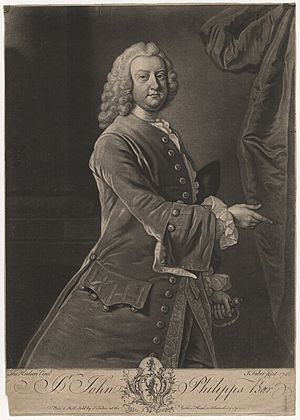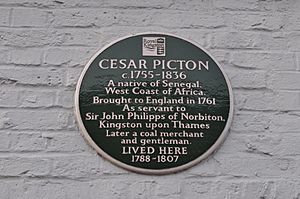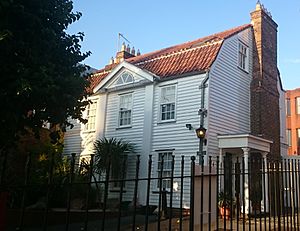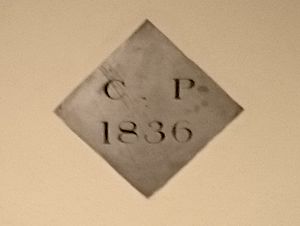Cesar Picton facts for kids
Cesar Picton (around 1755 – 1836) was a successful British businessman. He was born in West Africa. When he was about six years old, he was brought to England in 1761 by a British Army officer. This officer gave him as a servant to a well-known politician and lawyer, Sir John Philipps, 6th Baronet. Cesar mostly lived near Kingston upon Thames in Surrey. Later, Picton left the Philipps family and became a very rich coal merchant in Kingston.
Contents
Cesar Picton's Early Life

Cesar Picton was born around 1755 in a place called Senegambia in West Africa. His family was likely Muslim. In 1758, the British took control of Senegambia during a war. This area was a big part of the Atlantic slave trade. A British army officer bought a young boy who had been forced into slavery when he was about six. The officer brought him to England.
In November 1761, the officer gave the boy to Sir John Philipps, 6th Baronet. He also gave gifts like a parakeet and a special duck. Sir John and his wife, Elizabeth, arranged for the boy to be baptised. They named him "Cesar." He did not use the last name 'Picton' until much later.
After his baptism, Cesar became a page boy in the Philipps household. He wore a fancy velvet turban. He quickly became a favorite of the family, especially Elizabeth. When Cesar was about 33, a writer named Horace Walpole described him as "remarkably sensible." This meant he was very smart and understanding. He clearly had a special place in the family.
Cesar chose the last name 'Picton' from Picton Castle. This was the Philipps family's country home in Wales. This castle area was important for mining coal. Cesar might have chosen this name because he lived there for a short time in 1762.
When Picton first arrived in England, the rules about slavery were not clear. However, people who were enslaved in England were not treated the same way as those in other British areas. By 1772, a court case called Somerset v Stewart made it clear that no one could be a slave in England itself. By this time, most black servants were already treated as free, especially when they became adults.
From Tradesman to Gentleman
Sir John Philipps passed away in 1764, and his wife Elizabeth died in 1788. Their son then sold their home, Norbiton Place. Cesar Picton used £100 that Lady Philipps left him to start his own business. He became a coal merchant in nearby Kingston. It was common for servants to become tradesmen. Picton was well-known in the area after almost 30 years with the Philipps family.
The three Philipps daughters, who never married, moved to Hampton Court Palace after the house was sold. They later left Picton more money in their wills. This suggests they might have told their friends to buy coal from him. Picton had good "connections." It is also likely that he got his coal from the Philipps' estate at Picton Castle. This was a coal mining center, which was good for both of them.
Picton's first business place was at 52 High Street in Kingston Upon Thames. It was right next to the River Thames. Picton lived here for his first years in business. He rented it at first, but in 1795, he bought the building. He also bought other property, including a wharf on the Thames for unloading coal.
In 1801, Picton was found guilty of hunting without permission. He had to pay a fine of five pounds. This fine was not a big deal for Picton because he was wealthy. Someone with less money might have faced much harsher punishments. Picton appealed the decision, using a lawyer from London. The court still upheld the decision. Picton's race was not mentioned in the court's decision or in newspaper reports.
In 1807, Picton rented out his Kingston properties. He moved to a rented house in Tolworth. This might have been when he retired from actively selling coal, at age 52. By then, official papers described him as a "gentleman." In 1816, he bought a house with a large garden in Thames Ditton for £4,000, which was a lot of money back then. He passed away in 1836 at 81 years old. He is buried at All Saints Church, Kingston upon Thames.
Cesar Picton's Legacy
Cesar Picton was very successful in business and became rich. Most black people in Britain at that time did not achieve such wealth. However, some did become successful, like the writer Olaudah Equiano and the shopkeeper Ignatius Sancho. Other successful black business owners ran pubs or lodging houses. This shows that some black people were able to move up in society.
Picton mentioned a portrait of himself in his will, but no one knows where it is now. In 2007, it was discovered that a painting in a mural about Kingston's history, which was thought to be Picton, was actually of either Olaudah Equiano or Ignatius Sancho.
Picton is not known to have married. He left gifts to his friends, including 16 special mourning rings. Cesar Picton lived during a time when people were working to end slavery in Britain. However, it is not known if he was involved in this movement.
Both of his former homes, in Kingston High Street and in Thames Ditton, are now important historical buildings. They both have special plaques that tell people about Cesar Picton. The Kingston building is sometimes called Picton House. A meeting room at Kingston University is also named the Picton Room in his honor.
Cesar Picton is a character in the children's book Jupiter Williams by S.I. Martin. The story takes place in the year 1800.
Images for kids
See also
- List of slaves
- Black British people in the 17th and 18th centuries





